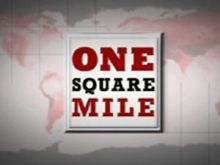DNIPROPETROVSK – A group of journalists of the British Broadcasting Corporation (BBC) shot material for the program One Square Mile. In past years the program’s television crew visited many cities in Asia, Africa and America. The BBC journalists chose Dnipropetrovsk — the aerospace capital of Ukraine — to be the first among the cities of the post-Soviet territory to show how the country developed over the last two decades of independence. “The objective of our project,” said the program’s host Fiona Foster, “is to see one or another country. For this the television crew comes to a certain city and shoots the most interesting stuff within the radius of one mile. Having come to Ukraine, we decided to steer clear of stereotypes. That is why we chose not Kyiv or some city in the West of the country that is known to tourists, but Dnipropetovsk, which was closed for foreign guests in Soviet times.” In order to show the life of a big city to television viewers, British journalists decided to show a number of symbolic objects, first of all the aerospace enterprise Pivdenmash. The British were surprised that the head of the design department Pivdenne Oleksandr Dehtiariov spoke fluent English, despite the fact that Ukrainian rocket specialists have worked for over a decade on international space projects like Sea Launch. In the workshops of Pivdenmash the guests were shown gigantic hulls of rockets, and learned about the enterprise’s past and its plans for the future.
The regional state administration, headed by Oleksandr Vilkul, who is trying to turn the Dnipropetrovsk oblast into Ukraine’s “investment gateway,” assisted the BBC journalists. The local government relies on investors to finish the construction of the world’s shortest subway, started back under Brezhnev.
Dnipropetrovsk, according to the British, impressed them as a lively city, where business life is in full swing, construction is taking place, and middle-class residents spend their leisure time in shopping malls and entertainment centers. At the same time, the luxurious boutiques and restaurants made them wonder about the social stratification of Ukrainian society. The BBC journalists, who wanted to learn more about the city’s Jewish community, were shown Eastern Europe’s biggest synagogue, Golden Rose, as well as a huge Jewish cultural center, which is scheduled to be opened early next year. They were impressed by the ancient customs and culture of the Ukrainian people, since they came just for the end of Pancake week. “It’s amazing that in such a modern urban center as Dnipropetrovsk ancient folk traditions can still be seen,” said the program’s producer Ali Wharf. “We are also glad that our arrival coincided with the celebration of the 8th of March. Here the celebration of this holiday is quite different from other European countries. There it is a feminism day, The Day of women’s struggle for their rights. In Ukraine it is the opposite. March 8 is The Day of womanhood, The Day when men give flowers and pay compliments.” The British journalists could observe the exotic ceremony of congratulating women on International Women’s Day in the Dnipropetrovsk airport, where the leader of the Batkivshchyna party Yulia Tymoshenko was met by her colleagues.
Nevertheless, guests from the BBC were above all interested in the life of ordinary Dnipropetrovsk residents, their opinion about what was going on in the city and the country, troubles and problems, and also hopes for the future. “When we were going to visit Dnipropetrovsk, many dissuaded us,” said the journalist of the BBC Ukrainian Service Marta Shokalo. “In their opinion, Dniptropetrovsk is a grey and boring ‘Soviet’ city. As it turned out, it is not so. This is a big flourishing city which works hard and relaxes in a cheerful manner.” According to the British journalists, the program dedicated to Dnipropetrovsk will be shown on BBC World already in March, and will also be available on the BBC website.







